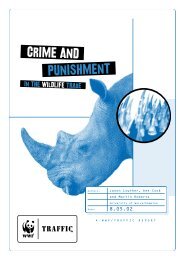Deeper Luxury Report - WWF UK
Deeper Luxury Report - WWF UK
Deeper Luxury Report - WWF UK
You also want an ePaper? Increase the reach of your titles
YUMPU automatically turns print PDFs into web optimized ePapers that Google loves.
In this chapter, we summarise seven strategic<br />
challenges faced by the luxury industry, which all<br />
necessitate a new depth to luxury through improved<br />
social and environmental performance.<br />
Challenge 1: Splendour amid squalor<br />
The geographical broadening of the luxury industry<br />
means that companies are increasingly selling in<br />
markets that are highly unequal and with significant<br />
poverty. During 2007, this raised concerns among<br />
government officials, celebrities and the wider public,<br />
including luxury consumers. Discussing luxury in India,<br />
the Financial Times pointed out that “the price tags of<br />
luxury goods could equal the annual income of a small<br />
Indian village”. 36<br />
The Prime Minister of India has called<br />
on the rich to “eschew conspicuous consumption” and<br />
on businesses to “promote socially relevant messages<br />
and causes” in their advertising. The tax on luxury goods<br />
charged by the Indian government is now 114%. 37<br />
Brands, beggar, belief, in New Delhi<br />
© Mayank Austen Soofi<br />
In China, the mayor of Beijing has said that<br />
advertisements for luxury products “are not conducive<br />
to harmony”. 38<br />
The local market regulator added that<br />
“there is a problem with certain advertising not<br />
conforming to the demands of a socialist spiritual<br />
civilisation”. 39<br />
Consequently, the mayor of Beijing ordered<br />
all luxury billboards to be removed. 40<br />
In Egypt, Al-Ahram<br />
newspaper warned against the new “immersion in<br />
luxury consumption” that “can only worsen the situation<br />
where political extremism and political oppression<br />
combine to destroy the social fabric of our country”. 41<br />
How can luxury be more socially acceptable in societies<br />
of high inequality? By generating more value for everyone<br />
involved in (or affected by) its manufacture and supply;<br />
by preventing irreparable damage to the beauty and<br />
biodiversity of the global commons; and by developing<br />
processes, techniques and materials that are consistent<br />
with the demands of sustainable development. Such an<br />
approach requires a level of investment that lower<br />
priced brands may not be able to match.<br />
By meeting this challenge, luxury brands could encourage<br />
affluent consumers in China and India, who are known<br />
to save a relatively high proportion of their income, to<br />
spend more on luxury goods and services. 42<br />
In China, the<br />
concept of luxury relates to the Confucian concept of<br />
“face”, or personal reputation. There are two aspects<br />
to face: mien-tzu and lien. The former usually refers to<br />
material prestige and displays of wealth, while the latter<br />
refers to moral standing, the loss of which makes it hard<br />
to function in Chinese society. 43<br />
The Mandarin term for<br />
luxury may be translated as “show-off goods”, indicating<br />
that luxury consumption is currently driven by mien-tzu.<br />
In future, it may be driven to a greater extent by lien.<br />
Challenge 2: Democratised luxury<br />
“Our products have become more accessible and by<br />
definition less exclusive... it is this, our very success,<br />
that imperils us,” says Guy Salter, the forward-thinking<br />
deputy chairman of Walpole. 44<br />
The socio-economic<br />
broadening of luxury brands across different product<br />
sectors, social classes and time zones has undermined<br />
their exclusivity. According to some experts, the concept<br />
of democratisation has devalued that of luxury. According<br />
to Dana Thomas, the culture and fashion writer for


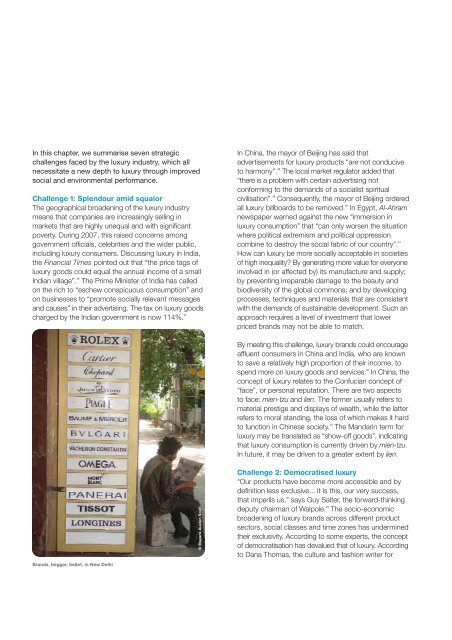


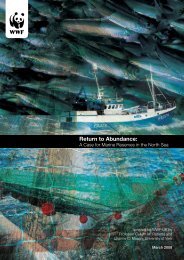


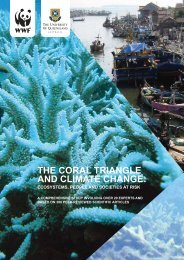

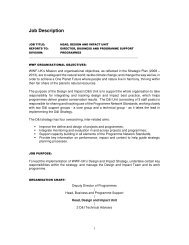



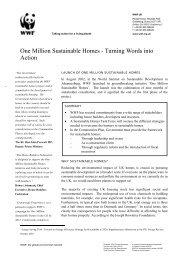
![[PDF] Causes for concern: chemicals and wildlife - WWF UK](https://img.yumpu.com/31929970/1/184x260/pdf-causes-for-concern-chemicals-and-wildlife-wwf-uk.jpg?quality=85)
